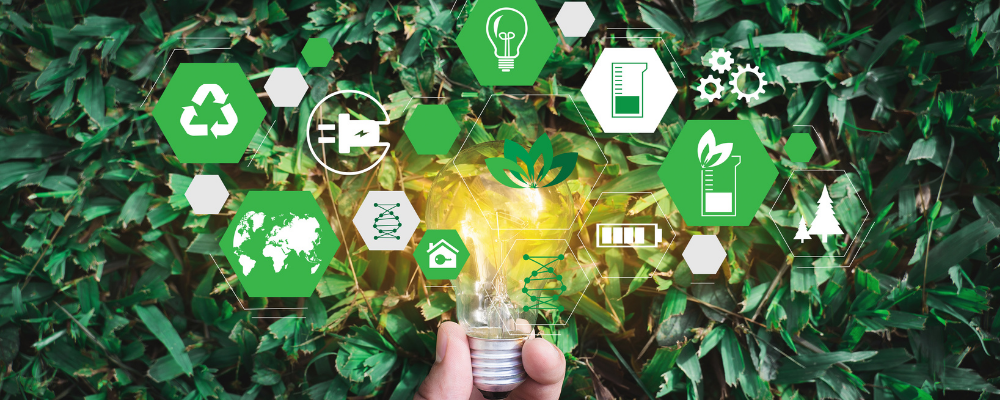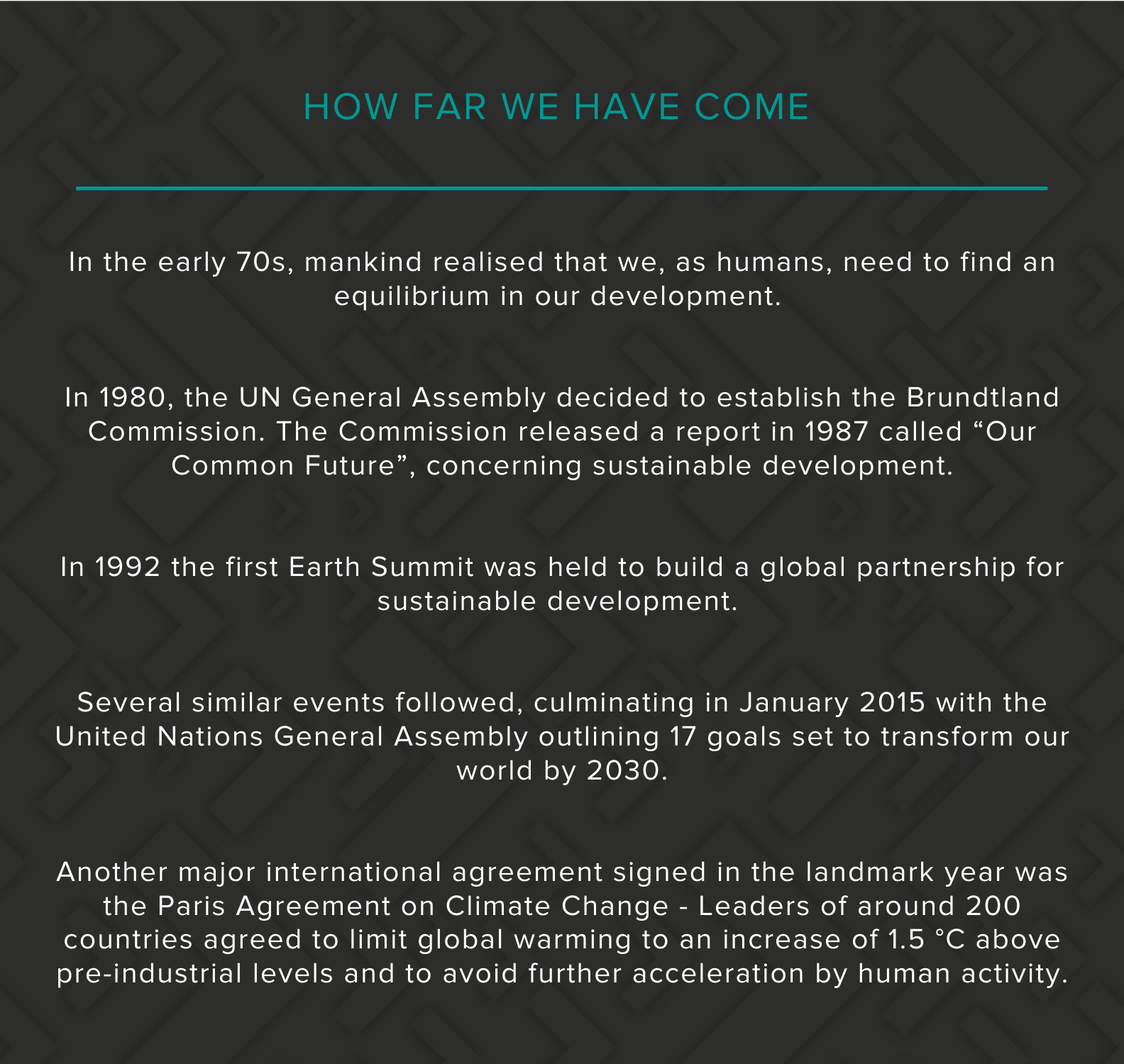Drop off your CV
We'd love to hear from you. Send us your CV and one of our specialist consultants will be in touch.

As reported by Google Trends, the interest in sustainability is growing. In the aftermath of COP26, business leaders are increasingly making sustainability a big target for 2022.
With such peaked interest in the natural environment and carbon emissions, how has the industry reacted to the loud calls for sustainability? CSG takes a closer look.

Widely considered the global expert on the sustainability movement, Bob Willard published pivotal research. Many business leaders have the misconception that going green is costly and therefore, is not feasible - especially with the reverberating effects of the global pandemic still being felt. However, Willard’s research showed the opposite.
In his well renowned book, Willard explains how if a typical SME were to implement best practice sustainability approaches, they’d see an increased profit of 51%. Similarly, a larger manufacturing company could see an increased revenue of 81% if they introduced the same practices.
Canadian based metal fabricating company VeriForm put Willard’s sustainability practices to the test, achieving:
The company had invested $46,186 and yielded energy savings of $89,152 with an average payback period of 6.3 months.
And VeriForm isn’t the only corporation implementing sustainable strategies. Walmart’s CEO Lee Scott put forward three sustainability goals:
1. Use 100% renewable energy
2. Create zero waste
3. Sell products that sustain people and the environment.
As businesses, we must take a lead role in creating this transformation by elevating and implementing sustainable practices and products. At CSG Talent, we are passionate about finding the right people to create the appropriate, sustainable solutions for your business. As candidates increasingly consider potential employers sustainable development goals, aligning your employer brand with candidate motivations has never been more important.
Food, drink, clothing, packaging, and non-food FMCG are rising to the challenges of sustainability. We cannot discuss sustainability in consumerism without referencing fast fashion.
Indeed, few realize the full extent of social and environmental damage caused by the fashion industry. Fashion is the world’s second most polluting industry, it is estimated that emissions from the sector will rise more than 60% by 2030, and by 2050 it will use up a quarter of the world’s carbon budget. However, there is hope.
Elle UK recently researched the attitudes and awareness of sustainability in the fashion industry amongst young women:

A recent BBC short documentary which aired in October 2021, investigated Coca-Cola’s plastic packaging nightmare - selling more than 100 billion single-use plastic bottles each year. Meanwhile, Netflix’s Sea Spiricacy catapulted the topic of environmental sustainability and the potential impact of biodiversity decline - the documentary was one of the top ten most-watched films on Netflix in several countries in the week of its release and generated significant traction on social media.
Without a doubt, consumers are becoming more aware and there is a mutual feeling of responsibility for environmental protection for future generations. As a result, several large corporations have pledged to do better:
A report by the IPCC predicted that as a planet, we have around 12 years to turn things around. At CSG Talent, we’re excited about the opportunities this brings for emerging talent. We are hungry to source and help develop diverse talent who can make a real difference in our fight for the planet. Over the last 18 months, we have seen a shift in candidate motivations, with many seeking more information regarding company values and attitudes towards sustainability, wanting to feel aligned before making the decision to join a business.
Sustainability in technology has already made its way into mainstream use. Typical examples of sustainable technology and innovations include:
Moreover, technological innovation is changing the face of transportation as we know it. In October 2021, The British government stated that: “rapid and unprecedented action” will be required to effect change, with hopes to reduce car use, aiming to reach net-zero by 2050.
This could include a shift towards solar-powered trains, via the ‘Riding Sunbeams: First Light’ project - the first generation of solar traction networks powering trains. Indeed, many are calling for an increase in freight transport believing that utilizing rail would help to combat climate change. Freight trains do emit 80% less CO2 than HGV per tkm (one tonne transported in one kilometer). Moreover, they have fewer external costs. 
Seems too far from reality? How about a flight around the world powered by solar? Swiss explorer, Bertrand Piccard, and entrepreneur, André Borschberg, did just that - proving that travel is possible without fossil fuels.
The construction industry is, by its very nature, a big user of natural resources. As a result, there is increasing pressure on construction firms to reduce their environmental impact.
Aside from the potential for destroying wild habitats, the construction industry’s carbon footprint is high:
However, there have been great strides made towards bringing renewable energy to construction sites.
One popular solution is a modular battery system that can be deployed on-site that recharges via solar panels. These batteries can power electric tools and vehicles, as well as security equipment, offsetting an estimated tonne of CO2 per week, alongside 400 liters of diesel.
Despite this, the World Green Building Trends 2018 Smart Market Report conveyed that up to 40% of UK firms stated that affordability was their greatest hurdle in adopting sustainable construction practices.
The truth of the matter is that green buildings come with lower operating costs, according to the British Assessment Bureau. Moreover, the use of sustainable technologies in construction processes could potentially deliver €410bn yearly savings on global energy spending.

Women in Mining volunteer, Lucy Crane, explained in her Ted Talk, there is a disconnect in society regarding what we consume and where it comes from - even with regards to sustainability.
Have you ever stopped to think, how do we make these wind turbines? Solar panels? Over the last 5000 years, humanity has extracted around 550 million tonnes of copper. To meet the demand for low carbon technologies, such as the copper wiring used in wind turbines, we need to extract the same amount in the next 25 years. Similarly, the world bank announced that the demand for lithium (used to make electric car batteries) is set to rocket 965%.
This investment and demand for greener solutions are positive. However, we cannot ignore one pivotal question - where are the materials coming from?
Lucy Crane: “The Lithium in just one electric car's battery has already traveled 50,000 km before the car has even driven”.
To make electrical vehicles truly sustainable we must look to localize the production of lithium. And to do so, we must look to talent. Innovative, diverse, alternative thinkers who can harbor this type of solution. And that’s exactly what we’re doing at CSG.
With our global reach, we can place high quality candidates who can provide the solutions to meet growing demands and create more sustainable business plans for growth.
It is as sustainable as we choose to make it.
If we, as business leaders, agree to support, implement and develop strategies, not only shall we reap the benefits environmentally - knowing we played our part in securing the planet for our children, we can also benefit financially and encourage economic growth in the aftermath of Covid-19.
At CSG, we listen to our candidates. We take the time to understand what is important to them, what are their deciding factors before they accept a job role? At this moment in time, candidates are increasingly concerned about sustainability and therefore, it is high on their list of determining factors. We are working closely with clients to understand their focus and development areas in sustainability, ensuring this is promoted to help attract the right talent that can help them on the journey to becoming more sustainable.
If you’re keen to develop your sustainability strategy through your sector's emerging talent, speak to a member of our expert team today.